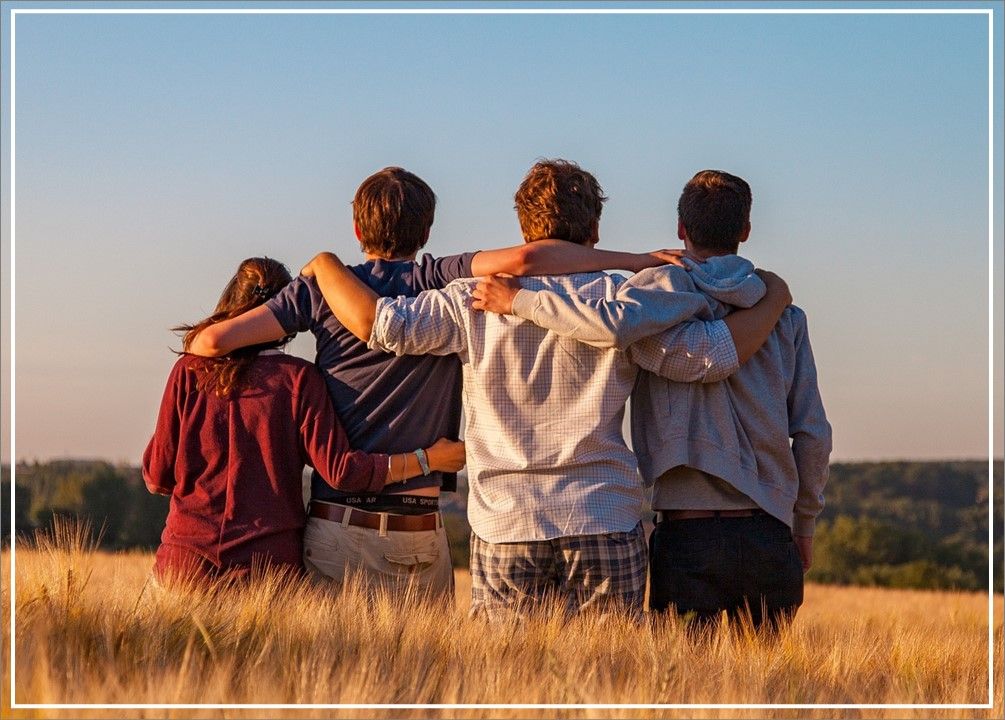8 characteristics of a positive relationship

Other articles you might also enjoy:
6 tips to start your day the right way
don't let the mean girls rule your mind
... and many more
Have you ever wondered why some people make relationships seem effortless whilst you find them challenging and hard work?
Do you think they are better than you, smarter than you, nicer then you?
Or perhaps you believe they have the key to the secret that you don’t?
If you find relationships challenging, you’re not alone. When being brutally honest, most of us will admit to struggling at relationships. However, just because you may find relationships, romantic or platonic, challenging now, doesn’t mean it has to always be that way.
Just because you may struggle in some or all of your relationships doesn’t mean you’re not cut out to be in relationships.
I can offer you not one, but eight keys that, when used together in combination, can improve your relationships and bring more positivity into them.
So, before you dash off to your cave to pursue the life of a hermit, never crossing paths with another soul again, check these out, practice them, and add them to your relationship toolbox. And I can guarantee they’ll help you bring more positivity into your relationships.
#1 Honesty
Honesty is deemed to be the foundation for trust within any relationship. And trust is necessary for a relationship to function, never mind thrive. Without the trust that honesty brings, a relationship can never stand firm and stable. It will always be on shaky ground.
When you’re honest, all of the time, it creates belief in the other person in the relationship that you’re not hiding anything, trying to manipulate them in any way, or scheming in an attempt to get what you want, get your way.
Being honest means you explain what you feel and say what you think. It doesn’t mean you have to be harsh or uncaring when you speak your mind or relate your feelings. It’s always possible, and advisable, to be honest from a loving perspective showing respect and empathy for the other person in the relationship. True honest comes from an open and loving heart, and a willingness to be vulnerable.
Honesty brings with it a high and positive vibration which brings a lightness and brightness to a relationship. For example, your conscience will always be clear and you can breathe easy, the other person (or persons) in the relationship will value your opinion and ask for your perspective, you’re more relaxed because you’re not hiding anything, and the other person(s) will feel more at ease also.
#2 Transparency
Being transparent in a relationship means you can share everything you feel or think without hesitation or feeling judged. That doesn’t just mean the positive emotions, feelings and thoughts such as happiness, joy, love. It also includes the lower emotions, feelings and thoughts such as those pertaining to sadness, fear, or anger.
The concept of transparency often leaves us feeling uncomfortable because, to be transparent, you need to be vulnerable. And vulnerability tends to lie far outside our comfort zone. More often than not, we try not to reveal our true selves to those around us because that often includes revealing fears, shames, and weaknesses, things we like to keep quiet, private, protected, guarded.
However, it is only when we are vulnerable can we build trust and honesty. Furthermore, by embracing and owning the fears, shames, weaknesses that may rise to the surface as a result of being vulnerable, we can connect with the other person(s) in our relationship.
Wanna learn more about the power of vulnerability from a renowned expert? Then watch this TedTalk.
#3 Trust
Trust is the cornerstone of any relationship. “So why not mention it first?” you might be thinking? Well whilst trust is a necessity for the survival and thrival (I know that’s not a word…) of any relationship, you can’t build trust without honesty and transparency.
How do you feel when you know that you can trust someone? Well, trust makes you feel safe. Anything you say or do with another person in a relationship or in their presence won’t become the latest piece of hot gossip doing the rounds. You feel safe knowing the other person has your back and can honour your wishes.
Trust also brings a closeness between those in a relationship. And I’m not just talking closeness such as intimacy within a romantic relationship, I’m also talking about creating a strong bond of closeness in a platonic relationship. When you feel close to someone and know you can trust them, you can safely let your guard down, feel comfortable with and around them, and feel support from them.
#4 Respect
Respect means you accept someone for who they are, even when your opinions, thoughts, ideals may differ. It doesn’t mean that you never disagree or argue. What it does mean is that you listen and give space to the other person’s opinions and feelings.
It also means that you don’t try to change any person in a relationship so they fit your views and ideals better. Going into a relationship, romantic or platonic, thinking you can and should change and mold the other person will immediately set the relationship up to fail. Similarly, when you’re in a relationship, you will continue to change and grow. Your opinions, beliefs, thinking, ideals may change through time as you experience more of life and the world around you. And the same will happen to anyone else in the relationship. When there is respect in a relationship and the persons are not afraid to grow and change, the relationship itself can also blossom and grow as a result.
Respect within a relationship is exhibited through positive behaviours such as supporting the passions, listening to the feelings, speaking kindly to, honouring the boundaries of the other person(s) in the relationship. Showing respect is done through words, actions and behaviours.
#5 Compromise
There will always be differences of opinion or ideas or likes in a relationship. No two (or more) people can like everything equally and in exactly the same way. So, compromise will always be necessary in a healthy relationship.
The thing about compromise is that it’s not about giving in or not getting your way, it’s about finding a middle ground that is respectful and considerate to everyone in the relationship. It’s about mutually agreeing on a settlement where differences are present and is a healthy way in which each person in the relationship can maintain their own personal beliefs, opinions, values, and ideals.
What compromise isn’t is a dirty word. A lot of people feel that compromising is giving up or is a way to dismiss and cover up real feelings that may be arising between all persons in a relationship. However, compromise is all about finding balance. It doesn’t mean that each person can’t voice their own opinion or feelings, it means that a resolution can be found that is fair to all involved; a balance resolution that bridges the gap between the persons involved, making everyone feel heard, respected, understood, and represented.
#6 Clear Communication
Communication within a relationship allows one person to explain their needs, wishes, expectations to another, and for that other person to hear and listen to them. Communication is a 2-way street requiring both speaking and listening. All too often many of us forget about the importance of the latter.
However, it’s not just communication, both the speaking and listening, that’s important, it’s vital that that communication is clear so all persons in the relationship understand what the other’s needs, wishes, and expectations are. If the communication isn’t clear, it may be misunderstood or misinterpreted, both of which can lead to conflict.
A person may fail to communicate clearly in a relationship if they fear that their opinion and ideas may be rejected or discounted or that they may hurt another person in the relationship. All this links back to the necessity to have honesty, transparency, and trust in the relationship.
#7 Empathy
Empathy is the capacity to understand or feel what another person is experiencing from their perspective regardless of whether you share the same circumstances. In other words, it’s the capacity to place oneself in another's position. The ability to empathise with another person enables you to create a connection with them, to relate to and understand them, to walk a mile in their shoes, and to offer support.
Empathy doesn’t only enable us to appreciate and, sometimes, even feel what another person in the relationship is experiencing, it also enables all persons within the relationship to create a stronger connection and deeper understanding of each other. A stronger connection and deeper understanding in turn increases satisfaction, reduces conflicts, misunderstandings, and disagreements, and can make a relationship more resilient in challenging times.
By taking the time to understand and even feel what another person in the relationship is experiencing will build a strength and connection that can weather any storms that may come.
#8 Laughter
You’ll have heard the phrase, “laughter’s the best medicine”, but can laughter also bring healing to a relationship?
There have been numerous studies performed on the positive effects of laughter and, indeed, laughter is a high vibe expression and emotion, something we want included in our relationships.
Laughter, though, is a key way in which humans bond as it brings us closer together. When we laugh we release endorphins from our brain, hormones which can make us feel happier, more at peace, and secure. Also, because it helps create and strengthen a bond between people in a relationship, the constant of laughter can help carry a relationship through more challenging and difficult times.
When you’re feeling low and sad, having someone who knows how to turn things around and make you laugh, without making fun of how you’re feeling or belittling the situation, is like gold-dust.
How many of these characteristics do you, and others in your relationships, already practice? And how many would you benefit from including?
Are you also keen to hear what the angels and your guides have to say about bringing positive energy into your relationships? Check out the link to this card reading below.
Viv xx
